Bishop da Cunha’s 2022 Christmas Message
Dear Friends in Christ, In the Gospel account by Luke, an angel appears to the shepherds to announce the birth of Christ, saying: “Glory to God in the highest heaven, and on earth peace to those on whom His favor rests” (Lk 2:14).
From that Gospel has come the oft-used phrase in Christmas cards and carols, “Peace on earth, goodwill toward men.” Perhaps we have shared this as a greeting during the season. Although meant as a sincere sentiment, one longed to be brought to fruition, the world continues to live in darkness.
For centuries, God tried to bring people together to live in harmony. They would always return to evil, sin, division, and rejection of God. Finally, God sent His Son, Jesus, to become one of us and to show us, by word and deed, what God expects of us, and to show us how to live in love, peace, and harmony. The prophet Isaiah says, “For a Child is born to us, a Son
is given to us; upon His shoulder dominion rests. They name Him Wonder-Counselor, God-Hero, Father-Forever, Prince of Peace” (Is 9:5).
Yes, Jesus is the Prince of Peace; yet peace continues to elude us.
After 2,000-plus years of Christianity, we live in a divided world confronting sin, evil, hatred, racism, injustice, and war. Because we have rejected the teaching of Jesus and the Word of God and
have embraced a secularized way of life, we are facing these problems and seeing the suffering of so many people throughout the world.
I know we would all like to live in a world guided by justice, peace, harmony, and love. A world that is reflective of the light and peace of Jesus. The way to embrace the life God intends for us is to return to the Lord, listen to his Word, and
follow his teachings. Otherwise, the world, each one of us, and especially the next generation, will pay a very high price.
My profound hope this Christmas is that hearts everywhere will be open to Jesus and that the gift of the peace of Christ will reign in our diocese, in our country, and around our world. May harmony and understanding overcome discord and division wherever they exist.

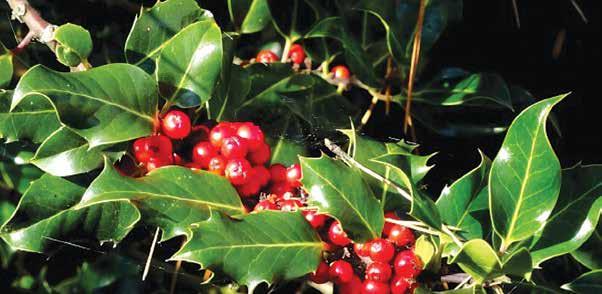
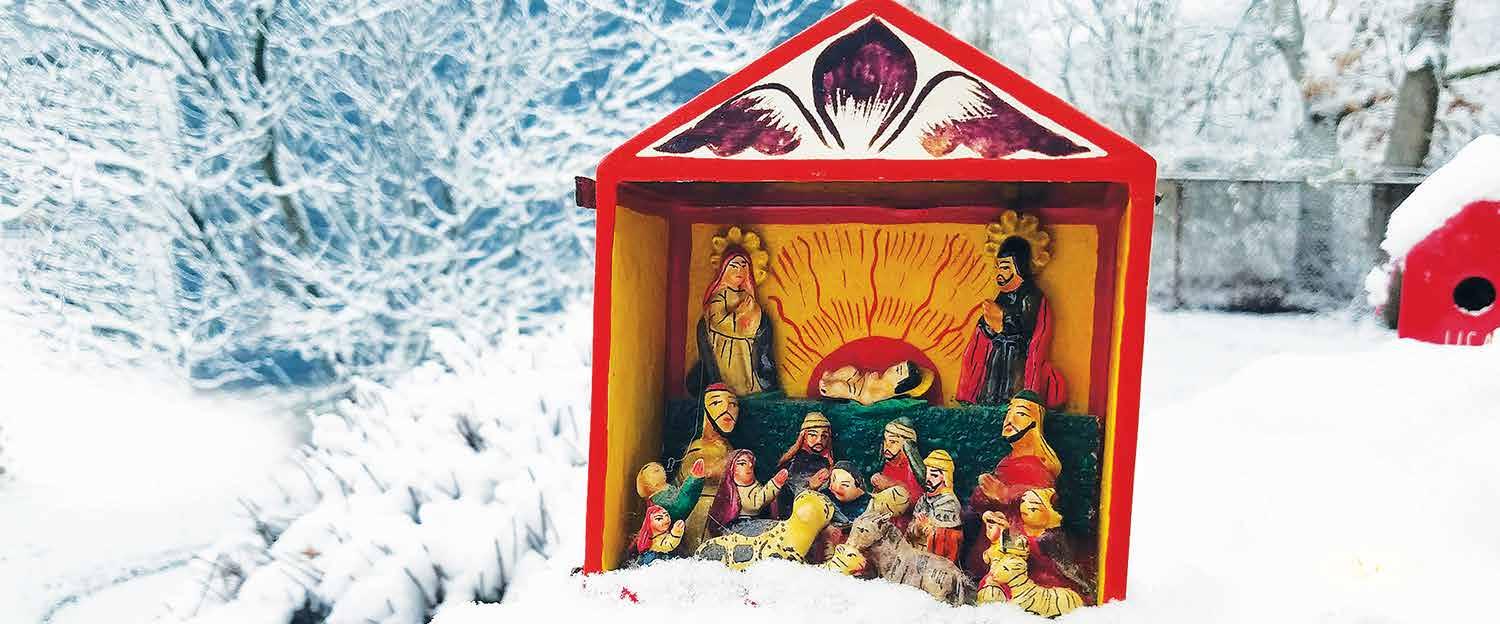

In closing, let me assure you, my brothers and sisters in the Diocese of Fall River, that you have my heartfelt prayers and best wishes for a very happy, joyful, and Merry Christmas. May God bless you and your loved ones now and in the coming New Year.
Sincerely yours in Christ, Most Reverend Edgar M. da Cunha, S.D.V. Bishop of Fall River

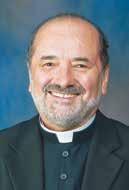

December 23, 2022 1
Bishop Connolly High School partners with Bristol Community College for early College Access program
FALL RIVER — Bishop
Connolly High School recently announced its partnership with Bristol Community College to offer BCHS students early access to college through Bristol’s College Access program.
Beginning in January 2023, Bishop Connolly students will have the opportunity to earn college credits while attending high school, giving them a successful head start on their college careers and educational goals. Funded by a grant from BayCoast Bank, the program will offer a targeted

sequence of courses towards a major in business, engineering/ STEM or health sciences/nursing.
“We are excited to partner with Bristol Community College
tunity to access college early and explore their options for majors in specific fields of study.”
Credits earned for successful completion of courses taken at


edge, skills and confidence that will lead to college and career success. With a 100 percent college acceptance rate, Bishop Connolly graduates pursue undergraduate studies at the nation’s top-tier colleges and universities, including Ivy League universities, Catholic colleges, public universities and service academies.
on this educational initiative,” said Kathleen St. Laurent, Bishop Connolly High School President/ Principal. “The program will give our students a wonderful oppor-
Bristol Community College will also be accepted at numerous higher education institutions, including the University of Massachusetts five-campus system, Northeastern University, Providence College, Bryant University and Lesley University. Under the direction of BCHS Vice Principal of Academic Affairs Megan dos Santos and Kimberly Griffith, Academic Coordinator for Bristol’s College Access program, the dual enrollment program offers students a unique college experience, providing a strong foundation for careers in diverse industries.
“I look forward to working with our neighboring Bishop Connolly High School and connecting them with college-level courses of interest in the in-demand fields of business, healthcare and STEM,” said Griffith.
The College Access program at Bishop Connolly is currently being offered free of charge to BCHS sophomores, juniors and seniors. Students may choose courses in specific tracks, which will include in-person and online instruction by BCC professors.

Bishop Connolly High School is a coed college preparatory Catholic high school focused on helping students build the knowl -
It serves students from over 30 cities and towns throughout Southeastern Massachusetts and Rhode Island. Bishop Connolly High School is accredited by the New England Association of Schools and Colleges and is an AP Capstone Diploma school.
Bristol Community College has core values rooted in student success and lifelong learning. For more than 50 years, Bristol has served as a leading resource for education and workforce development in the region including locations in Attleboro, Fall River, New Bedford, Taunton and Online.
The college offers more than 130 career and transfer programs, along with flexible online offerings that lead to an associate degree, a career-ready certificate, or the ability to transfer to baccalaureate colleges throughout the state and country. Bristol’s Business Solutions & Partnerships provides customized training for businesses and the community. The college says it also strives to put the needs of learners first with support services and career advancement opportunities that lead to student success by reducing barriers to educational access.
December 23, 2022
Visit the Diocese of Fall River website at: fallriverdiocese.org
“We are excited to partner with Bristol Community College on this educational initiative,” said Kathleen St. Laurent, Bishop Connolly High School President/Principal. “The program will give our students a wonderful opportunity to access college early and explore their options for majors in specific fields of study.”
Help needed to unlock $120,000 grant to benefit St. Joseph’s House
HYANNIS — A ministry of Catholic Charities of the Diocese of Fall River, the St. Joseph’s House Shelter in Hyannis provides emergency shelter for hundreds of men and women every year, as well as a Day Program that offers respite from the streets, resources, skill-building activities, and caring support. The George and Marie Chabot Foundation’s Trustees have issued a challenge that will ultimately provide $150,000 for St. Joseph’s House Shelter in Hyannis — with a demonstrated
match of $30,000 in hand, the Chabot Foundation will award an additional $120,000. These funds will strengthen St. Joseph’s House services, improving the program’s staffing, equipment, and furnishings; as well as supporting the program’s operations and its Winter Overflow response which provides additional emergency shelter beds on evenings that are 28 degrees or below.
Miriam Finn Sherman, CEO of the Catholic Foundation of Southeastern Massachusetts said, “This



is an incredible opportunity to unlock a significant multi-year gift to support extremely vulnerable members of our community. Our goal is to raise the $30,000 match by December 31, 2022 so we can begin the new year with an infusion of resources benefiting St. Joseph’s House. The Christmas season is one of giving and we hope that the faithful in the Diocese of Fall River may widen their circle of giving this year to include this special match, if their circumstances allow.”
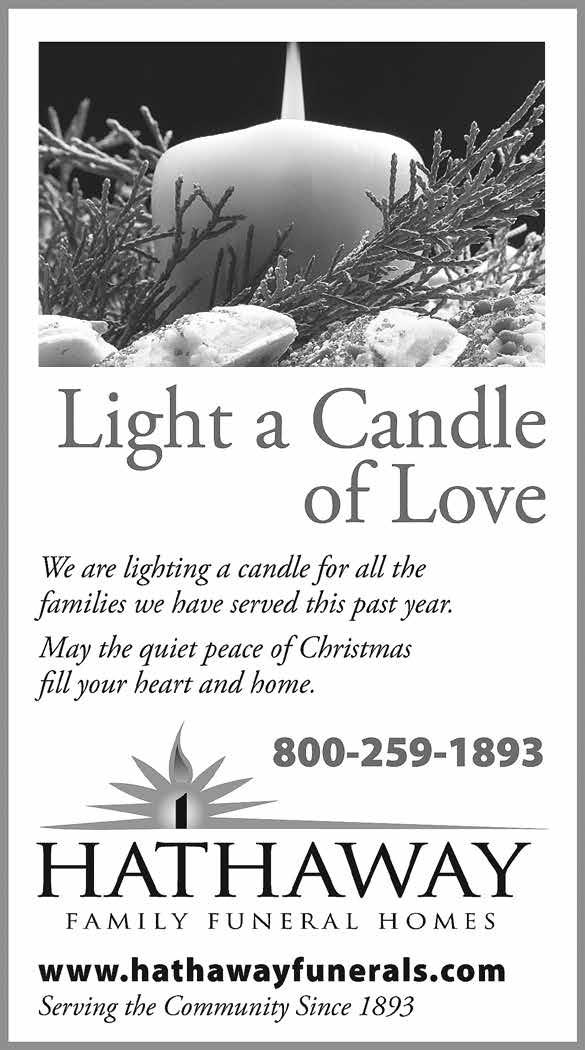
Daily Readings † December 24 - January 13
Sat. Dec. 24, 2 Sm 7:1-5,8b-12,14a,16; Ps 89:2-5,27,29; Lk 1:67-79. Sun. Dec. 25, The Nativity of the Lord, Vigil: Is 62:1-5; Ps 89:4-5,16-17,27,29; Acts 13:1617. 22-25; Mt 1:1-25. During the Night: Is 9:1-6; Ps 96:1-3,11-13; Ti 2:11-14; Lk 2:1-14. Dawn: Is 62:11-12; Ps 97:1,6,11-12; Ti 3:4-7; Lk 2:15-20. Day: Is 52:7-10; Ps 98:1-6; Heb 1:1-6; Jn 1:1-18. Mon. Dec. 26, Acts 6:8-10; 7:54-59; Ps 31:3cd4,6,8ab, 16bc,17; Mt 10:17-22. Tue. Dec. 27, 1 Jn 1:1-4; Ps 97:1-2,5-6,11-12; Jn 20:1a,2-8. Wed. Dec. 28, 1 Jn 1:5—2:2; Ps 124:2-5,7b-8; Mt 2:13-18. Thu. Dec. 29, 1 Jn 2:3-11; Ps 96:1-2a,2b-3,5b-6; Lk 2:22-35. Fri. Dec. 30, Sir 3:2-6,12-14 or Col 3:12-21; Ps 128:1-5; Mt 2:13-15,19-23. Sat. Dec. 31, 1 Jn 2:18-21; Ps 96:1-2,11-13; Jn 1:1-18. Sun. Jan. 1, Mary Mother of God, Nm 6:22-27; Ps 67:2-3,5-6,8; Gal 4:4-7; Lk 2:16-21. Mon. Jan. 2, 1 Jn 2:22-28; Ps 98:1,2-3ab,3cd-4; Jn 1:19-28. Tue. Jan. 3, 1 Jn 2:29—3:6; Ps 98: 1,3cd6; Jn 1:29-34. Wed. Jan. 4, 1 Jn 3:7-10; Ps 98:1,7-9; Jn 1:35-42. Thu. Jan. 5, 1 Jn 3:11-21; Ps 100:1b-5; Jn 1:43-51. Fri. Jan. 6, 1 Jn 5:5-13; Ps 147:12-15,19-20; Mk 1:7-11 or Lk 3:23-38. Sat. Jan. 7, 1 Jn 5:14-21; Ps 149:1-5,6a,9b; Jn 2:1-11. Sun. Jan. 8, Baptism of the Lord, Is 60:1-6; Ps 72:1-2,7-8,10-13; Eph 3:2-3a,5-6; Mt 2:1-12. Mon. Jan. 9, Heb 1:1-6; Ps 97:1,2b,6 ,7c,9; Mk 1:14-20. Tue. Jan. 10, Heb 2:5-12; Ps 8:2ab,5-9; Mk 1:21-28. Wed. Jan. 11, Heb 2:14-18; Ps 105:1-4,6-9; Mk 1:29-39. Thu. Jan. 12, Heb 3:7-14; Ps 95:6-7c,8-11; Mk 1:40-45. Fri. Jan. 13, Heb 4:1-5,11; Ps 78:3,4bc,6c-8; Mk 2:1-12.
Donations may be made via check payable to the Catholic Foundation of Southeastern Massachusetts (memo: St. Joseph’s House) and sent to 450 Highland Avenue, Fall River,


Mass., 02720, or online at https://www.cssdioc. org/monetary-giftsonlinedonation/. Questions may be directed to: giving@ catholicfoundationsema. org.

December 23, 2022 3 www.anchornews.org
Did I make the right choices as dad was dying?
Sometimes people will contact the National Catholic Bioethics Center (NCBC) wondering if the decisions they made on behalf of a dying family member were the right ones. The NCBC provides a free Ethics Consultation Service where individuals can ask questions and seek guidance about ethics and medical decisions.
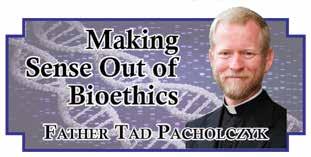
Some who call are interested in reviewing the details of how a loved one died, along with the advice they were given by doctors, nurses, hospice workers, family members and friends. While their loved one may have died months or even years earlier, they may still be unsure or unsettled about the treatment decisions they made.
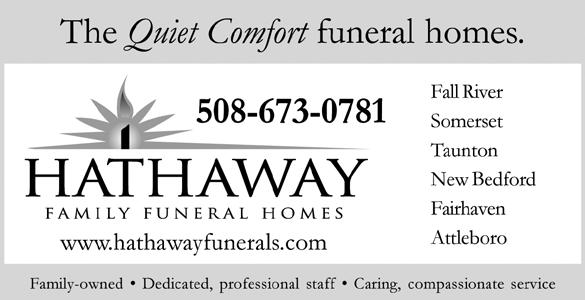
End of life situations are not easy to sort out. Important practical details and medical facts may no longer be available or may have been forgotten with the passage of time. Sometimes family mem-


bers may have disagreed with each other or were feuding about how best to proceed, or may not have wanted to seek out expert advice or guidance, so the decisions they made might have been hasty or under duress.

A friend once spoke to me about a young man who had shared with her some details about his father’s death. He told her that as he looked back on it, he had doubts that he had made the right decisions as his dad became more debilitated. He felt he had failed his dad because of the limited kinds of care he ended up authorizing on his behalf. My friend sought to reassure him that he really shouldn’t be troubled about it, because she couldn’t imagine that he would have done anything but his best under the circumstances, and so his dad likely had received very good care.
When she recounted the story to me, I asked, “But how would you actually know that his dad received good care and that the son really did make the

right choices? Objectively speaking, the son may be right that some of the decisions were poorly made or selfish or otherwise flawed.” I asked her whether her first instinct may have been to try to soothe his feelings and emotions, rather than considering
out continually having to look over his shoulder and wonder endlessly about whether he did right by his dad. Finding a sense of peace and resolution in this way is important, and his father, now long deceased, would, we could presume, want to see that kind of healing for his son as well.
ments that offer us more benefits than burdens.
It can be challenging to find useful and reliable sources of information to assist us as we try to make informed decisions about complex health care situations that may arise as death approaches.
the specific medical and ethical concerns he was raising.
I continued and offered: Maybe he really does need to discuss the facts of the case as best he remembers them. Perhaps he might benefit from bringing some of his concerns to the Sacrament of Confession. Assuming his concerns have some basis, even while acknowledging the uncertainties in his own decision making, such a step would help him find needed healing. By turning to the infinite mercy of God, and “clearing the decks” with the Lord in this manner, he would be strengthened to move forward in a new way with-
My friend was intrigued by my comments and acknowledged that her first inclination had been to try to palliate and calm the situation by mostly talking around the issues and concerns he had raised. On further reflection, she could see the value of dealing more directly with those concerns so he could find a real measure of closure.
Dying well, of course, is a profound grace, not only for the person who passes on, but for all who are left behind. To die well does not imply that we have to use every medical treatment that may be available. We are required only to use those medical treatments or procedures that are deemed reasonable or “ordinary.” In other words, we should avail ourselves of those treat-
I typically recommend these resources from the NCBC: (1) some of my writings on End of Life Decision-Making available at Tiny.one/EOL-decisions, (2) a newly-released video, entitled The Gift of Dying Well, available at Vimeo.com/bioethicsvideos, and (3) the NCBC’s Catholic Guide to End-ofLife Decisions available at Tiny.one/NCBC-Guide.
Our efforts to lovingly support our family members through the dying process and to make careful and morally correct decisions on their behalf as they decline in health are very important. Those committed efforts are signs of our desire to be faithful to the beautiful bonds of love connecting us to our dear ones and to the Lord of life. Therefore, we should never be afraid to seek counsel and to avail ourselves of the Church’s wisdom in these areas.
Anchor columnist Father Pacholczyk earned his doctorate in neuroscience from Yale and did post-doctoral work at Harvard. He is a priest of the Diocese of Fall River, and serves as the director of Education at The National Catholic Bioethics Center in Philadelphia. See www. ncbcenter.org and www. fathertad.com.
December 23, 2022
Please support the TV Mass Donate online at www.GiveCentral. org;FRTVMass Or mail your check payable to: Diocese of Fall River — TV Mass, 450 Highland Ave. Fall River, Mass. 02720
Diocese hires School Adjustment Counselor

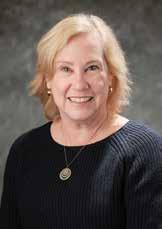

FALL RIVER — After an extensive search process, the Diocese of Fall River and Catholic Schools Office announced that Cynthia Roche has been appointed to the newly-created position of Diocesan School Adjustment Counselor. The main focus of this role is to support and assist the Diocese of Fall River Catholic schools with any student social, emotional, behavioral, or crisis needs, and is also available for consultations, resources, student meetings, small group activities, and classroom discussions. Roche also provides consultations with parents, teachers, and school leaders on the social and emotional well-being of students from Pre-K to grade eight, as well as high school as needed.
According to the National Alliance on Mental Illness, students are reporting a demonstrated increase in anxiety, depression, self-esteem, self-regulation, and general social and emotional needs. Moreover, the recent pandemic has exacerbated this problem as many students were not in school for months due to virtual learning, homeschooling, or in a hybrid model. The losses kids have suffered due to the pandemic include social skills as well as academics.
Most of the elementary Catholic schools in the Diocese of Fall River have at least a part-time counselor on site, but there is a need to bridge the gap to offer more than what the individual
schools can provide, in addition to offering extra support during a crisis or if there is a sudden increase in need. Roche will also be available to support teachers with any individual social or emotional needs as the current environment has been very challenging for educators in general.

According to Roche, “I have been very impressed with the school principals’ prioritization to meet the social and emotional needs of their students and faculty. Early in my career, I saw a broader variety of problems. However, recently, anxiety and depression have increased tremendously partly due to social media, which was not around 25 years ago. The ability for our schools to address students is so important for their overall health as I have worked with children experiencing anxiety as young as four years old.”
“An ever-present issue related to COVID is that young people need to learn how to play again,” said Lisa Serak, principal of St. Mary-Sacred Heart School in North Attleboro. “When students returned to a ‘normal’ classroom, we found that they struggled with how to interact with each other. Cynthia’s expertise and ability to address students on an individual
basis has been such a blessing, especially since it is so challenging to fill such positions.”
Dan Roy, Superintendent of Schools for the Diocese of Fall River said, “We welcome Cynthia to the Catholic Schools Office team that is charged with providing guidance and support to our schools striving to educate the whole person in nurturing, faith-filled environments. Drawing on years of experience at a
high-performing Catholic elementary school in Rhode Island, she is attuned to the challenges facing young people today. She is accustomed to meeting their needs by working in the context of a Catholic school and in partnership with families.”
Roche previously was a school counselor at St. Philomena (Pre-K to grade eight) in Portsmouth, R.I. for 25 years and has a Master’s degree in school counseling from Providence College. She is married and has three grown sons. She and her husband, John, belong to St. Barnabas Parish in Portsmouth, R.I.
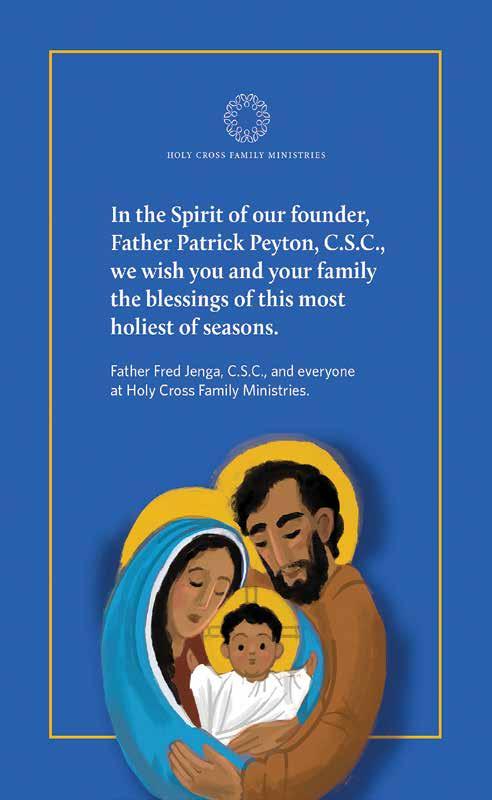
December 23, 2022 5
Christmas manna
In the middle of the Christmas Octave this year, on December 28, we will celebrate the 400th anniversary of the death and birth into eternal life of the great French doctor of the Church St. Francis de Sales (1567-1622). The patron saint of journalists and an avid apostle of the sanctity of the laity, he is one of the most revered bishops, apologists, re-evangelizers, spiritual writers, and directors of souls in Church history.
His quatercentenary is a good occasion to read or re-read not only his classic works “The Introduction to the Devout Life,” “The Treatise on the Love of God,” and “The Catholic Controversy,” but also, especially in these last days of Advent and the beginning of the Christmas season, his Sermons for Advent and Christmas.
These works of the “Gentleman saint” are a particularly rich mine of insights on the Holy Eucharist as we enter more deeply into the U.S. Church’s three-year Eucharistic Revival.
In a couple of Christmas homilies, St. Francis de Sales explored the initially surprising connection between Christmas and the manna God rained down for the Israelites in the desert. Prior to God’s giving this heavenly bread for the first time, Moses had told the grumbling children of Israel, “In the morning you shall see his glory” (Ex 16:7) and St. Francis used it as an analogy for what the angels said to the Bethlehem shepherds keeping watch over their flocks at night and what the Church says to us at the Christmas vigil.
“God desired,” he preached, “an even greater and more loving gift for us who live on earth as in a desert. He came himself to bring us this gift. … Thus, in the darkness of the night, Our Lord was born and appeared to us as an infant lying in the manger.”
Christ himself was the incarnation of the glory of God in the highest. That embodied glory was adored by the heavenly host, Mary and Joseph, the shepherds, wise men, and animals in Bethlehem. That enfleshed effulgence (Heb 1:3) remains for us to worship on the altar and in the tabernacle.
As St. Francis explains, “Manna is a figure of the incarnation of the Word. It also prefigured the Eucharist. Between the mystery of the Eucharist and that of the Incarnation there is only one difference: in the incarnation we see the incarnate God in his own Person, and in the Eucharist we see Him under a more hidden and obscure form. In both instances it is the same God-man who was born of the Virgin. Thus the manna that prefigured the Eucharist can also symbolize the Incarnation.”
Putting on display both his encyclopedic knowledge of Sacred Scripture and his famous habit to imitate Jesus in describing spiritual truths through earthly analogies, he said that just as manna had three distinct tastes — honey, oil and bread (see Ex 16:31, Num 11:8 and Wis 16:20) — so the incarnate Christ united, respectively, divinity, a human soul and a human body. He compared divinity to honey, which happens because of the work of bees coming from above; the soul to olive oil, which floats on top of other liquids; and the body to bread, the grain of which clearly grows from the earth.
But just as “manna had three tastes, but there was only one manna, so although in Our Lord incarnate there are three ‘substances,’ there is nevertheless only one person.”
This connection that St. Francis makes between manna and the incarnation — although perhaps rare for Christmas homilies — was not new.

Jesus himself, in fact, made the connection when, after the miraculous multiplication of the loaves and fish, he self-identified as the “True Manna from Heaven” that God the Father has given for the salvation of the world and then linked His incarnation to the Eucharist when He added, “I am the bread of life … that comes down from heaven so that one may eat of it and not die. … and the bread that I will give for the life of the world is My
flesh” (Jn 6:32-58).
So the one born in the place called in Hebrew “House of Bread” (Beth-lehem) and placed in an ancient animal food trough (the manger), was born as heavenly manna, as “living bread come down from heaven.”
It would take three decades for that truth to be proclaimed and centuries more for it to become more deeply understood. As St. Francis notes, however, it is, an essential truth by which to understand what we celebrate at Christmas.

St. Francis de Sales developed the Eucharistic dimension of Christ’s nativity and life in his other, more famous, works.
In his “Catholic Controversies,” which include the pamphlets he sent throughout the region of the Chablais to bring back (successfully) to the Catholic faith those who had become Calvinists, he wrote that the Blessed Sacrament is “the abridgment of our faith,” a “holy and perfect memorial of the Gospel” and an “admirable summing up of our faith.”
He built on the point of the Eucharist as the synthesis of the Christian faith and life in his “Introduction to the Devout Life,” when he declared that the Eucharist is “sum of all spiritual exercises, … the very center of our Christian religion, the heart of all devotion, the soul of piety, the ineffable mystery that embraces the whole depth of divine love, by which God, giving himself really to us, conveys all His graces and favors to men with royal magnificence.”
The Eucharist, in other words, summarizes the incarnation, birth, hidden life, public ministry, passion, death, resurrection, ascension and glorification of Christ, as well as the identity, center, life and mission of the Church as Christ’s body and bride.
In his “Treatise on the Love of God,” his deepest work, he unsurprisingly entered into the mystery of the Eucharist, which he called the Eucharist “the perpetual feast of divine grace” in which we receive “our Savior’s blood in His flesh and His flesh in His blood … given into our bodily mouths” so that each of us “might be intimately united with His goodness” and “unite his Savior with himself in reality and in the way of food.”
This points to what the Church implores in the Opening Prayer of the Mass on Christmas Day and each day at the altar as the priest mixes a drop of water into the wine in the chalice: “O God, who wonderfully created the dignity of human nature and still more wonderfully restored it, grant … that we may share in the divinity of Christ who humbled himself to share in our humanity.”
This “wondrous exchange,” this transforming union with God our Savior, is the meaning of Christmas and the Mass.




Because of the reality of Christ in the Eucharist and the work Christ seeks to accomplish in us by means of his continuous incarnate self-giving at the altar, St. Francis urges us, in the “Introduction to the Devout Life,” to “strive to your utmost to be present every day at this Holy Celebration,” and, if one can’t physically be present, “at least be sure to take part in it spiritually.”
Just as much as the Israelites each day ate the manna God rained down from heaven, St. Francis is urging us to do the same with the True Manna, which is the means by which we will enter far more deeply into the ongoing reality of Christmas, which is that Godwith-us is still very much with us.
As we prepare to celebrate Christmas, and to commemorate the great St. Francis de Sales on the 400th anniversary of the fulfillment of the Advent of his life, he beckons us to Christ in the Eucharist and urges us, like we sing on Christmas, “Come, let us adore Him” — and adoringly receive Him.
December 23, 2022
Editorial OFFICIAL NEWSPAPER OF THE DIOCESE OF FALL RIVER Published biweekly except for one week in autumn by the Catholic Press of the Diocese of Fall River, 887 Highland Avenue, Fall River, Mass. 02720 , Tel. 508-675-7151 ; FAX 508-675-7048 ; email: davejolivet@anchornews.org To subscribe to The Anchor online visit www.fallriverdiocese.org;subscribe Subscription price by mail, prepaid $29.00 per year for U.S. addresses. Please send address changes to The Anchor, PO Box 318, Congers, NY 10920, call or use email address. PUBLISHER – Most ReveRend edgaR M. da Cunha, s.d.v., d.d. Vol. 66, No. 23 EDITOR;PRODUCTION MGR. david B. Jolivet davejolivet@anchornews.org EXECUTIVE EDITOR FatheR RiChaRd d. Wilson INTERIM EXECUTIVE EDITOR FatheR RogeR J. landRy - fatherrogerlandry@anchornews.org ADVERTISING Wayne R. PoWeRs waynepowers@anchornews.org POSTMASTERS send address changes to The Anchor, PO Box 318, Congers, N.Y. 10920. THE ANCHOR (USPS-545-020) Periodical Postage Paid at Fall River, Mass. Please note: Because of postal and printing schedules over Christmas and New Year’s Day, The Anchor will next publish on January 13. The daily Mass readings appear on page three
Bishop’s blog: One-on-one discipleship
Peak: Planning Summit — One-on-One Discipleship
The Peak: Planning Summit featuring Everett Fritz will take place on January 7 as part of the diocese’s continuing participation in the National Eucharistic Revival, which you may recall is the U.S. bishops’ three-year grassroots movement to revive devotion and belief in the Real Presence of Jesus in the Eucharist.
This leadership event will help an -

swer some important questions on how we can truly embrace this grace-filled time and guide people to a deeper relationship with our Eucharistic Lord. Everett Fritz will discuss: Why is one-on-one discipleship important? How can you, as a catechist, DRE, youth leader, or simply an individual, engage with others to share
the Good News, “One Disciple at a Time?” And, what next steps
can our parish take after we’ve made those initial connections?
The January 7, 9 a.m. to 2 p.m. gathering at St. John Neumann Parish in
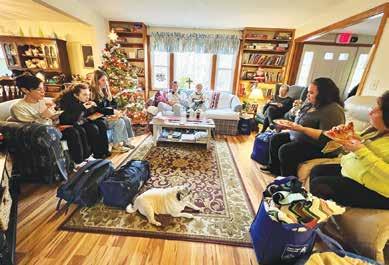
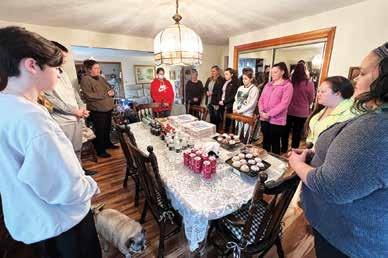
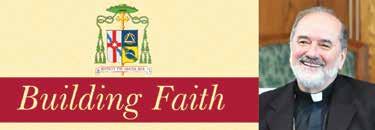
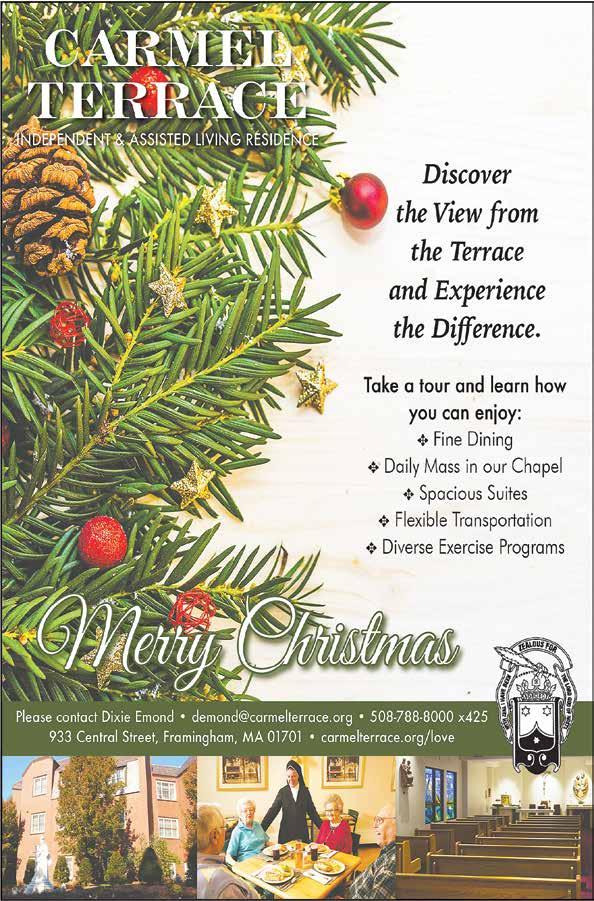

East Freetown, includes Mass, continental breakfast, lunch, training, discussion, and materials.
The cost is $30 per person, and the registration can be found at https://form. jotform.com
(Photos
December 23, 2022 7
Five ninth-grade Religious Education students from Holy Trinity Parish in West Harwich recently went to St. Clare’s Sober House in Hyannis, run by the diocese. The students were: Emory Hines, Sarah Groves, Patrick Jordan, James Allison, and Kate Murphy. They brought necessity gift bags for the women living there, visited with them and had pizza and cupcakes while bringing them some Christmas spirit.
by Joy Jarden)
All I want for Christmas ...
As I have gotten older my priorities have changed, and so has my Christmas wish list. Honestly, I wish I had more time to spend with the people that mean the most to me. I wish I worried less and trusted in God more. I wish I were more patient and less judgmental. I wish I laughed more, and loved more, and lived life more fully. Material things just don’t seem to matter much to me anymore. And so, with that in mind, I made my Christmas list a week or so ago, and here’s what I decided to do. This year I’m not going to ask for material things — no gloves, scarves, or hats for me!
To be honest, I have more things than I’ll ever use or need. So instead of asking for tangible gifts this year, I share with you my Christmas wish list. I’m going to remember the gifts that I was given at Confirmation, and I’m going to pray that I make better use of those gifts that only God can give — the gifts of the Holy Spirit.
I’m going to pray for the gift of wisdom. I’ve discovered that it takes wisdom to discern God’s will. Wis-
dom allows us to see God at work in our lives, and wisdom also allows us to distinguish that which is of God, and that which isn’t. Wisdom allows us to see that we are capable of transforming ourselves from within.
I’m going to pray for understanding. Understanding gives us the opportunity to delve deeper into our faith. Through understanding we are able to read and comprehend sacred Scripture. Understanding aids us in leading a Christian life.
I’m going to pray for counsel, often referred to as right judgment. Counsel gives us the ability to differentiate between right and wrong, sacred and sinful.
I’m going to pray for fortitude or courage — courage to trust in God, courage to speak out against injustice, courage to accept God’s will.
I’m going to pray for the gift of knowledge; knowledge permits us to understand and interiorize God’s commands and walk in right paths.
I’m going to pray for the gift of piety or reverence — perhaps the most important gift we can pray for, especially for those of us involved in parish ministry. When we are imbued with a

I decided I’m going to pray for one more gift. I pray that I have the patience to allow God to work through me and in me, and the patience to trust God’s plan for my life. It’s not easy. Patience has never been a virtue of mine. But I know that I can trust God to hear and respond to my prayer.
the poor and marginalized: stand up for justice and peace: and speak up for those who have no voice. May we be Christ’s presence in the world as we celebrate God’s gift to the world, Christ Jesus Our Lord. No other gift compares!
sense of piety, we enter into God’s gates with thanksgiving and into His courts with praise. When we exhibit reverence, our ministry and our liturgy cannot become routine or banal. When piety becomes a part of our everyday lives, we are able to cope with the stress that the busyness of church often brings.
I’m going to pray for the gift of the “fear of God.” Often misunderstood, fear in this instance refers to our awareness of God’s awe, majesty, and power.
Without these gifts of the Holy Spirit, it is impossible for anyone to maintain life as a Christian.
As we approach Christmas, amid all the madness of shopping, and parties, and the endless lists of things that absolutely must be done, may we never forget that we celebrate the greatest gift the world has ever known — Jesus Christ — God himself, come to earth because He loved us.
May we never forget to live our faith and our commitment to the Gospel. May we be the hands and feet of Christ: reach out to
And that my friends, is the Good News! I wish you all a blessed and holy Christmas season and God’s richest blessings in the coming year.
“For unto us a Child is born, to us a Son is given, and the government will be on His shoulders. And He will be called Wonderful Counselor, Mighty God, Everlasting Father, Prince of Peace” (Is 9:6).
Anchor columnist Ada Simpson is former editor of Ministry and Liturgy magazine, holds an M.A. in Pastoral Ministry, and is the director of Music Ministry at St. Francis and St. Dominic parishes in Swansea.
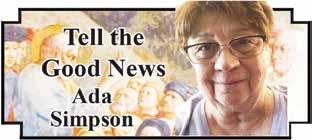
Diocese of Fall River TV Mass on the Portuguese Channel Christmas Day Sunday, December 25 at 7 p.m. Broadcast from Immaculate Conception Church, New Bedford

Diocese of Fall River TV Mass on the Portuguese Channel Sunday, January 1 at 7 p.m. Broadcast from Our Lady of the Holy Rosary Church, Providence
Diocese of Fall River TV Mass on the Portuguese Channel Sunday, January 8 at 7 p.m.
Broadcast from Espirito Santo Church, Fall River
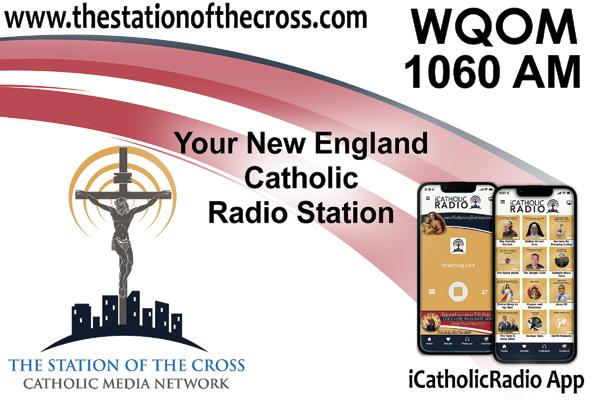
December 23, 2022
Diocesan group to attend March for Life on steps of Capitol
FALL RIVER — Plans are in the works for this year’s annual March for Life in Washington, D.C.
This year, rather than marching to the steps of the Supreme Court, where Pro-Life advocates have for decades asked the highest Court’s Justices to undo the destructive decision that was Roe v. Wade, folks will now march to a new front in the battle for life: the steps of the United States Capitol.
For more information on how you can attend this pilgrimage and attend the March in Washington, D.C. on January 20, call Irina DeLucca, Family and Respect Life Director at 508-669-7702.
Annual diocesan Women and Men’s Conference is March 11

EASTON — Registration is now open for the Fall River Diocese 2023 Women and Men’s Conference set for Saturday, March 11, 2023, at Stonehill College in Easton.
Presenters will be Mari Pablo of The Evangelical Catholic and Ascension Presents and Father Roger Landry, a priest of the Diocese of Fall River, who is serving as a National Eucharistic Preacher for the National Eucharistic Revival.
The Conference will include prayer, music, time for reflection, multi-lingual breakout sessions, lunch, vendors and a 4 p.m. closing Mass celebrated by Bishop Edgar M. da Cunha, S.D.V.
Plan to join Catholics from throughout the diocese for this day of spiritual renewal and enrichment during Lent.
Register by January 23 for an early bird discounted fee. Visit www. fallriverdiocese.org for details.

Please pray for these priests and deacons during the coming weeks:
Dec. 24
Rev. James K. Beaven, Pastor, Sacred Heart, Taunton, 1886
Rev. Timothy J. Duff, Assistant, St. Joseph, Woods Hole, 1914
Dec. 27
Rev. Thomas J. Stapleton, Pastor, Corpus Christi, Sandwich, 1956
Rev. Msgr. Armand Levasseur, Retired Pastor, St. Anne, New Bedford, 1970
Rev. Manuel Andrade, Former Pastor Our Lady of Health, Fall River, 1995
Dec. 28
Rev. Charles R. Smith, Pastor, Immaculate Conception, Fall River, 1955
Rev. Edward J. Sharpe, Pastor, St. Patrick, Somerset, 1987
Rev. Clement Paquet, O.P., Assistant, St. Anne, Fall River, 1987
Rev. Msgr. John Smith, Retired, Catholic Memorial Home, Former Pastor, St. Pius X, South Yarmouth, 2021
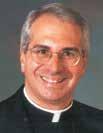
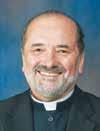
Dec. 29,
Rev. Rafeal Flammia, SS.CC., Retired Pastor, Our Lady of the Assumption, New Bedford, 1993
Rev. Robert J. Kruse, C.S.C., 2015
Rev. Kevin Harrington, Pastor, St. Francis of Assisi, New Bedford, 2020
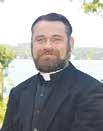
Dec. 30
Rev. Robert C. Donovan, Pastor, St. John the Evangelist, Pocasset, 2016
Dec. 31
Rev. Thomas C. Mayhew, Pastor, Our Lady of Mt. Carmel, Seekonk, 1991
Jan. 1
Rev. Jose Valeiro, Pastor, St. Elizabeth, Fall River, 1955
Rev. Antonio M. Fortuna, Pastor, Immaculate Conception, New Bedford, 1956
Rev. Francis R. Connerton, SS. STD., St. John’s Seminary, Plymouth, Mich., 1968
Rev. Leo T. Sullivan, Pastor, Holy Name, New Bedford, 1975
Jan. 4
Rev. Eugene L. Dion, Pastor, Blessed Sacrament, Fall River, 1961
Rev. Joseph L. Powers, Founder, St. Elizabeth Ann Seton Parish, No. Falmouth, 1999
Rev. Francis B. Connors, Retired Pastor, Our Lady of Victory, Centerville, 2003
Jan. 5
Rev. L. Octave Massicotte, 1922
Rev. William McClenahan, SS.CC. Former Pastor, Holy Redeemer, Chatham, 1994
Jan. 6
Rev. James F. Roach, Founder, Immaculate Conception, Taunton, 1906 Rev. Rene G. Gauthier, Pastor, St. Jean Baptiste, Fall River, 1997 Permanent Deacon Antonio Cruz, 2009
Jan. 7
Rev. Alfred R. Forni, Pastor, St. Francis of Assisi, New Bedford, 1970
Rev. Gustave Gosselin, M.S., La Salette Shrine, Attleboro, 1989
Rev. Jude Morgan, SS.CC., Former Pastor, Our Lady of Lourdes, Wellfleet, 2003
Rev. Raymond Robida, 2003
Jan. 8
Rev. John Kelly, Founder, St. Patrick, Fall River, 1885
Rev. Alfred J. Carrier, Founder, St. Jacques, Taunton, 1940
Rev. Arthur C. Lenaghan, USA Chaplain, Killed in Action, 1944
Rev. Evaristo Tavares, Retired Pastor, Our Lady of the Angels, Fall River, 2000
Rev. Louis Joseph, 2000
Diocese of Fall River TV Mass on WLNE Channel 6
Sunday, December 25, Christmas Day
Special time: 7 to 8 a.m.
Jan. 9
Rev. William F. Morris, Pastor, Corpus Christi, Sandwich, 1982
Sunday, January 1 at 11:00 a.m.
Celebrant
Sunday, January 8 at 11:00 a.m.
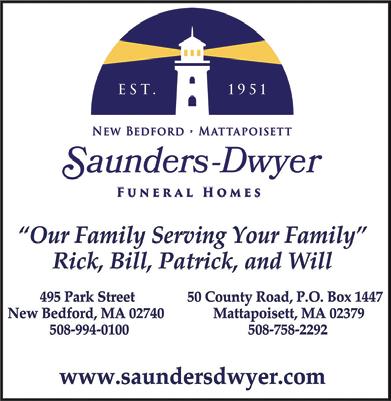
December 23, 2022 9
In Your Prayers
Celebrant is Bishop Edgar M. da Cunha, S.D.V.
is Father Laurent Valliere, Parochial Vicar of Our Lady of Victory Parish in Centerville
Celebrant is Msgr. Stephen J. Avila, V.F. Pastor of St. Joseph, Guardian of the Holy Family Parish in Falmouth
and Y oung a dulT
Don’t dive in the shallow end: Surface level relationships
When I was younger, I wanted to make friends so desperately that I would compromise good judgment. At the public pool one day I saw a sign that said, “Do not dive in the shallow end,” and I did not read a warning; rather I saw a challenge and opportunity to make friends. I dove into the shallow end, only to be met with my head hitting the bottom of the pool. Praise God I did not get a seriously hurt, other than a bruised ego and weeks of embarrassing reminders. You would think I learned my lesson, but I later found myself at the edge of a cliff and a body of water below me, while my friends screamed “Jump!”
In life there are moments when we engage in something because on the surface it seems to be desirable and easy: play a sport because it looks fun, join a club because it seems interesting, become a member of a parish ministry, record a TikTok because it is trending, or even entertain the idea of joining a Pastoral Parish Council. Each of these has a deeper commitment to them but we do not see until we are hip deep in it. There is more than just what is seen on the surface, something much deeper. We see it through because that is what holy grit looks like. We need a similar perseverance in our friendships.
Jennifer Baker, PhD wrote in an article for “Psychology Today”: “There


are certainly mysteries involved in friendship, despite how confident we might be about the practical advantages of having a good friend or two. And no matter how much we appreciate our friends, the relationship is still likely to be a peculiar one, full of ups and downs and a particular kind of commitment.”
She continued: “Aristotle’s account of friendship might be his most-studied proposal. Aristotle suggested that there were three types of friendship: a pleasure-based sort, where you stay friends as long as you are having a good time with a person; a utility-based sort, where you stay friends because it is so convenient to do so; and a virtue-sort, which is the very best kind of friendship. Aristotle tells us you are to live your life with a friend like this, sharing meals and everyday experiences together. But all of this depends on your commitment to pursuing virtue, and most of us don’t have the time.
Friendships are important infrastructures within our social development. People who find a good set of friends are willing to do just about anything for them, because they become an extension of their families and themselves.
Abraham Maslow’s “ Theory of Hierarchy of Needs,” has been discussed and criticized throughout
the years. Needs are listed in a progression of psychosocial, safety, love/belonging (friendships, romantic attachments, family relationships, social groups, community groups) churches and religious organizations, esteem, and self-actualization.
Friendships fall into the human need of love/ belonging which can only be reached if the person feels safe enough. Once a friendship/relationship is established, an individual’s esteem is built up, and that self-esteem fuels a person’s self-actualization.
CS Lewis in his book “Four Loves” said: “To the Ancients, Friendship seemed the happiest and most fully human of all loves; the crown of life and the school of virtue. The modern world, in comparison, ignores it.” Jesus longs for a friendship with us, and we ignore that as well. In fact, in the Gospel of John it says: “ This is my commandment: love one another as I love you. No one has greater love than this, to lay down one’s life for one’s friends. It was not you who chose Me, but I who chose you” (Jn 15:1213,16a).
Many will claim to be friends with Jesus, but the
question is whether the friendship is shallow or deep. Back to Aristotle’s friendship models, pleasure, utility, and virtue. Where does our friendship with Jesus’ fall? Do we go on a retreat or conference and become friends with Him because it felt good at the time? That’s pleasure based. Do we pray to Jesus only when we are in need of help? That’s utility-based. Or do we follow Him and interact with Him because He leads us to a virtuous life? That’s virtue-based.
All three can be healthy when they are centered on virtue. The saints were men and women who were able to share a complete relationship with Jesus, one that was full of joy, one that asked Jesus for help and one that allowed them to live virtuous lives because of Him.
St. Maximilian Kolbe said the following about Jesus in the Eucharist: “You come to me and unite Yourself intimately to me under the form of nourishment. Your Blood now runs in mine … giving courage and support.”
This statement is a commitment to a true friendship with Jesus who is always present in the Eucharist. Jesus is fully present at every Mass, and in every adoration chapel and in every tabernacle within a Catholic Church. Fully present, looking to take you from a surface level friend-
ship to a deeper friendship where you feel His love, ask for His help, and grow in virtue. You can use your friendship with Jesus is the standard by which you measure all your other friendships. It can calibrate whether you are in a balanced friendship or not. I was on the edge of the cliff overlooking the body of water in Hilo, Hawai’i when I heard my friends, who had already taken the dive, scream “Jump!” I wrestled with it for several moments. I screamed back, “You got me, right?,” to an instant reply, “Of course … always.”
Jesus knows that we fear the deep, yet He invites us as He invited Peter to get out of the boat and join Him. For as long as we keep our eyes on Him, we will walk over the surface of the deep, as if we were walking in the shallow depths. I looked up before I got my running start. I said to myself, “Jesus I am only scared because I fear the deep. Not just the depth of the water, but anything that will require me to trust past my comfort. Jesus, that isn’t a jump to make friends, this is a jump to solidify my friendship with you. Jesus I trust in You.” As I ran and jumped into the water, I finally let go of my fear, and I truly gave my heart to my one true friend, in which I measure all friendships.
Anchor columnist Oscar Rivera Jr., is director of Youth Ministry in the diocesan Secretariat for the New Evangelization. orivera@dioc-fr.org
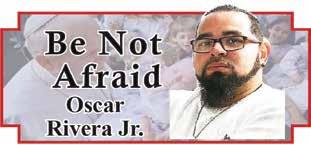
December 23, 2022
C
T he C hur
h and Y ou T h
s
It is said that the English language boasts more words than French, German and Italian combined. Is it any wonder that it is so difficult for a new speaker of English to become fluent in the language? This column is not going to be about language,·but rather about one word in English as it is used in our Catholic faith: REAL!
The word real can have several widely different meanings in English. In ordinary speech it could mean true, legitimate, actual, and other similar adjectives, but all of these adjectives fail when we speak of real estate. Similarly, all these concepts fail when we speak of the Real Presence of Jesus in the Eucharist. As when speaking of property, there is a specific, technical meaning of the word real, so also when speaking of the presence of Jesus in the Eucharist. To use one of the meanings from ordinary speech for this presence of Jesus will only leave us confused and in serious error.
To come to an understanding of the meaning here, we have to take a look at some history. In Europe during the period known as the Reformation many theories about the presence of Christ in the Eucharist were developed by the Protestant Reformers, and some are still being devised in our own time. One that had rather wide popularity was that Jesus was spiritually present in the Eucharist. That is, because of the ubiquity of God (God is everywhere), the Eucharist contains the presence of Jesus spiritually. This was perhaps because the Reformers rejected the concept of Christian priesthood that is needed for Mass and the consecration of the Eucharist. Rejecting a mere spiritual presence based on the ubiquity of God, the
Let’s get REAL!
Catholic Church countered with the word real rather than spiritual.
The origin of this word comes from various Latin adverbs based on the Latin word res, a thing. The thing present was the physical body and blood of Christ, born of Mary, and now here present under the appearance of bread and wine. The word real here means tangible, touchable. The humanity of Jesus is as near and approachable to us as he was to the Apostles during his preaching career, as He was at the Last Supper. It would not be useful to explain all the various ways in which different Christian denominations have struggled to come to grips with the presence of Christ in the Eucharist without a priesthood. Beyond not being useful, it would be confusing and dismaying to see how this wonderful aspect of our faith has been distorted by fellow Christians. Instead, I shall simply quote some appropriate passages from Scripture and various Catholic writers over the years.
The author of the fourth Gospel writing around the end of the first century spoke of Jesus teaching in Capernaum, and no doubt that situation mirrored the state of affairs in his own time as well.
“I am the living bread that came down from heaven; he who eats this bread will live forever; and the bread that I will give is My flesh for the life of the world” (Jn 6:51).
“Then many of His disciples
who were listening said, ‘This saying is hard; who can accept it?”’ (Jn 6:60).
“As a result of this, many of His disciples returned to their former way of life and no longer accompanied Him” (Jn 6:66). Jesus let those who would not believe Him return to their former way of life.
St. Paul writing to the Corinthians challenged the lack of faith of some Christians using quite strong language: “W hoever eats the bread or drinks the cup of the Lord unworthily will have to answer for the body and blood of the Lord. A person should examine himself and so eat the bread and drink the cup. For anyone who eats and drinks without discerning the body, eats and drinks judgment on himself” (1 Cor 11:27-29).
Do you think Paul would have used such strong language and envisioned such dire consequences if it were not the faith of the first-century Christians that the Eucharist is the very Body and Blood of Jesus?
While these are not the only passages in the New Testament that speak of the presence of Jesus in the Eucharist, I want to move on to cite a few other witnesses to our Catholic faith.
Ignatius of Antioch (Letter to the Romans, A.D. 110) wrote: “I have no taste for corruptible food ... I desire the bread of God, who is the flesh of Jesus Christ ... and for drink I desire His blood.”
Justin Martyr (1st Apology, A.D. 151) penned: “The food which has been made into the Eucharist ... is both the flesh and the blood of that incarnated Jesus.”
Augustine (Sermon 227, A.D. 411) declared: “That bread which you see on the altar ... is the body of Christ. That chalice, or rather, what is in that chalice is the blood of Christ.”
From every century and from all parts of the Christian world, similar quotations could be cited, but there is no need: this is our Catholic faith.
Can we understand how this takes place? I could quote the word transubstantiation, but that is simply a word based on Aristotelian philosophy. I would rather say that the how and why of the Real Presence is to be found in the power and love of God, just as is creation itself. If a person is not ready to embrace the power and love of God, I question if he is ready to say, “I am a Christian.”
I now live in a residence for retired priests and there is a little chapel next door to my room. Every time I enter or leave my room I stop to have a little conversation with Jesus. Sometimes I picture Him sitting on a stone or walking by the shore. I say “Hi, Jesus,” have a few words and then go on about my business. When you come before the tabernacle in church and bend your knee to the floor in genuflection, do you recognize before you the touchable, tangible humanity of Jesus; Son of Mary, eternal Son of God? Are you real Catholic? Do you acknowledge the Real Presence? If not, get real!
Father Buote is a retired priest of the Diocese of Fall River and a regular contributor to The Anchor.
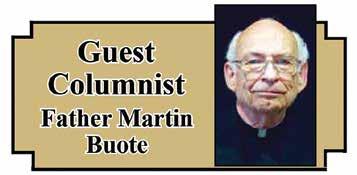

Vatican dismisses Father Frank Pavone from priesthood
WASHINGTON, D.C. (CNA) — Father Frank Pavone, a well-known Pro-Life activist and national director of the organization Priests for Life, has been dismissed from the clerical state for “blasphemous communications on social media” and “persistent disobedience of the lawful instructions of his diocesan bishop,” CNA has learned.
In a December 13 letter to U.S. bishops obtained by CNA and confirmed by multiple sources as authentic, Archbishop Christophe Pierre, the apostolic nuncio to the United States, wrote that the prefect of the Dicastery for the Clergy issued the decision on November 9, adding that there was “no possibility of appeal.”
“Father Pavone was given ample opportunity to defend himself in the canonical proceedings, and he was also given multiple opportunities to submit himself to the authority of his diocesan bishop,” explains a separate statement attached to Pierre’s letter. “It was determined that Father Pavone had no reasonable justification for his
actions.”
Pavone, however, told CNA Saturday that he had not been notified about the Vatican’s judgment.
The communication from Pierre does not specify the actions that led to Pavone’s dismissal or name the bishop he disobeyed.

December 23, 2022 11
8
Turn to page 12
After all is said and done, it is just another day
We are once again on the cusp of another new year. I had often heard it said by my parents and other members of their generation that every year seems to fly by faster and faster as they pile up.
As most of them have passed on, my generation is becoming, as I had mentioned in an earlier column, the next wave crashing on the shore from that immense ocean called life.
And yes, I concur with my predecessors: each year is going by faster and faster, and to be frank, the glitz and excitement of celebrating New Year’s Eve has waned through the years.
after a few minutes, I fall asleep again.
I mentioned earlier how the new year used to hold the promise of better things ahead, but COVID derailed so many things, including the parties and First Nights and revelries.
It did allow me to reflect on the fact that even in healthy times there have always been others to whom New Year’s Eve and Day meant nothing but just another day of misery, pain, fear, loneliness, despair and financial hardships.
The last few years have taught me a very important lesson and opened my eyes to view more clearly and with a better understanding about those who don’t walk in my shoes.
The statement refers to Pavone as “Mr. Pavone” and calls him “a lay person,” underscoring the dramatic and immediate nature of the Vatican’s action.
There was a time when I would look forward to attending holiday parties, waiting for the ball to drop and then reveling and celebrating the birth of a new year “filled with promises and better things ahead.” Or there were times when my mates and I would attend a First Night fest in a local city, accepting the cold as part of the charm and ambience of the event.
Those New Year’s Eve parties continued, but my routine didn’t include them any longer. The reveling morphed into cozying up on the living room sofa and watching the ball drop with a few friends, exchanging a peck on the cheek, then saying goodnight as we all headed to our respective beds to sleep in the next morning.
Now, the only ball I see dropping live is one a Patriots’ receiver muffed at a crucial moment, since I’m already in bed when the big moment occurs.
As a treat, on some New Year’s Eves, I’m awaken by the sound of local fireworks entertaining the generation of the next wave. I lie back and think back on fun times long since come and gone. Then
Along with going to bed hours before the dawn of a new year, my recent spinal surgery and the months leading up to it and the recovery after greatly altered the everyday activities that I now know I took for granted.
I realize that just because one day it’s 2022 and then next is 2023, it’s really, after all is said and done, just another day.
My pains and limitations will be there despite the changing of the final number of the year. I realize that for those who live with misery, pain, fear, loneliness, despair and financial hardships, nothing will change because the year has.
The thought of a new year with new things is exciting, but not realistic. The only thing that can evoke a change for those who could truly use it, is for all of us to remember them — in our daily thoughts and, more importantly, our prayers. And for us to help in other ways, the best we can.
If there is really a resolution for me to make, it’s to become more in tune with my hurting sisters and brothers and resolve not to forget them and their plights.
To those who fight a daily fight, my prayers for you that 2023 can indeed be a year of promise, and know that I am with you.
Peace my friends. davejolivet@anchornews.org

“Since Priests for Life, Inc. is not a Catholic organization, Mr. Pavone’s continuing role in it as a lay person would be entirely up to the leadership of that organization,” the statement says.

Pavone is still saying Masses, including one streamed online Saturday. The Priests for Life website states that Pavone “is a Catholic priest in good standing, and exercises his ministry in full communion with the Catholic Church.”
In an email to CNA on Saturday, Pavone said that he was not aware of the Vatican’s action. “How did CNA learn about this before I did?” he asked. In a subsequent email he added that CNA’s inquiry was “the very first communication that came to me about this.”
It is not clear in what diocese Pavone, 63, is incardinated as a priest. On the Priests for Life website, it says he received permission from the Vatican in 2019 to transfer from the Diocese of Amarillo, Texas, where he was incardinated in 2005, to another, unnamed diocese.
Pavone hosted the show “Defending Life” on EWTN for many years until the bishop of Amarillo, Texas, revoked Pavone’s permission to appear on the Network. EWTN is the parent organization of CNA.

Originally based in Staten Island, N.Y., Priests for Life is now headquartered in Titusville, Fla., within the Diocese of Orlando. That diocese, also, did not respond to CNA’s request for comment Saturday.
Pavone has served as the Pro-Life organization’s national director since 1993. In that role he has a long history of conflicts with bishops, beginning more than 20 years ago with the late Cardinal Edward Egan of the Archdiocese of New York. Egan succeeded the late Cardinal John J. O’Connor, who ordained Pavone in 1988 and encouraged his Pro-Life work.
In his email, Pavone directed CNA to a post on his personal website titled “Summary of How Fr. Frank and Priests for Life Have Been Treated by Some in the Hierarchy.”
“We all expect that the pro-abortion groups, like Planned Parenthood, will target, harass and try to intimidate us. And they do try,” he wrote.
“But when such treatment comes from bishops and other Church authorities — which it increasingly does — it’s particularly deplorable,” he added. “Instead of supporting and encouraging the Pro-Life work of the Church, some of these men try to obstruct and hinder it, and abuse their authority to try to intimidate priests and laity who make ending abortion the top priority of our lives.”
Pavone also reportedly tweeted that he would hear the Confession of a Catholic who votes Democrat, “but we are trained that in the absence of repentance, absolution has to be withheld.”
In response, the Amarillo Diocese issued a statement disavowing Pavone’s comments, saying he used “scandalous words not becoming of a Catholic priest.”
“These postings are not consistent with Catholic Church teachings,” the diocese said in its statement. “Please disregard them and pray for Father Pavone.”
December 23, 2022
Father Frank Pavone dismissed from priesthood continued from page 11




































